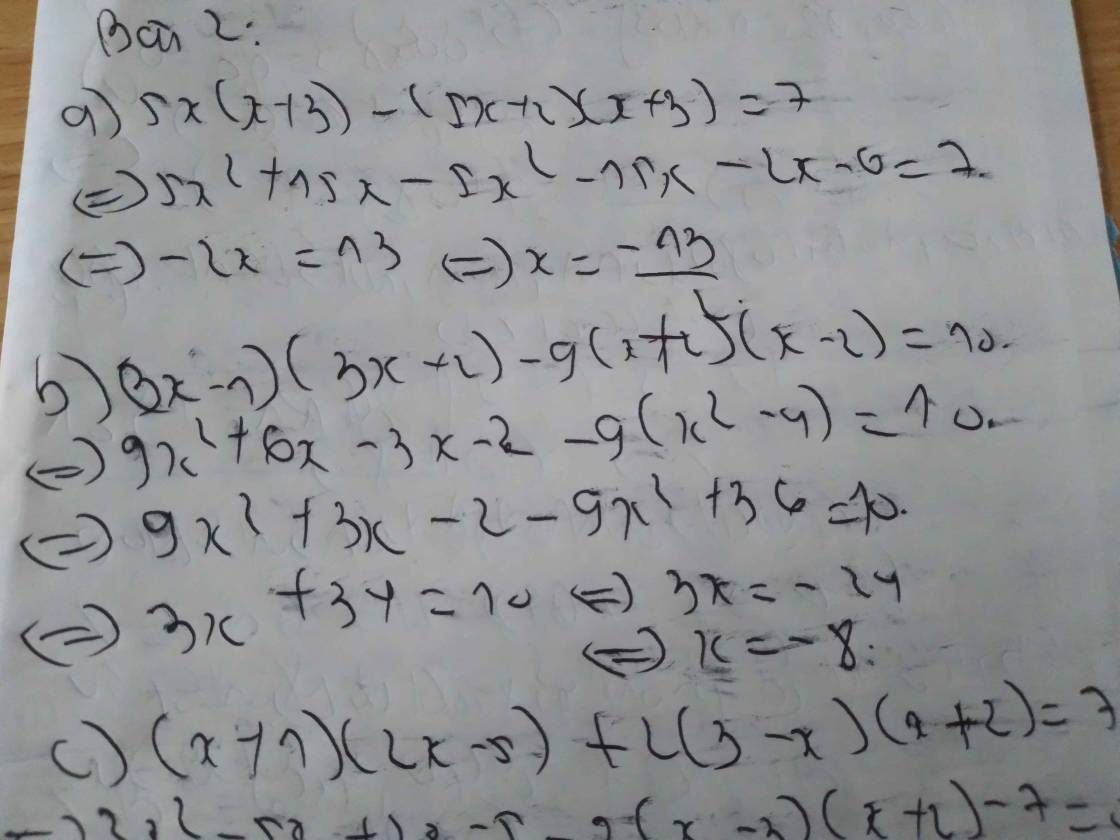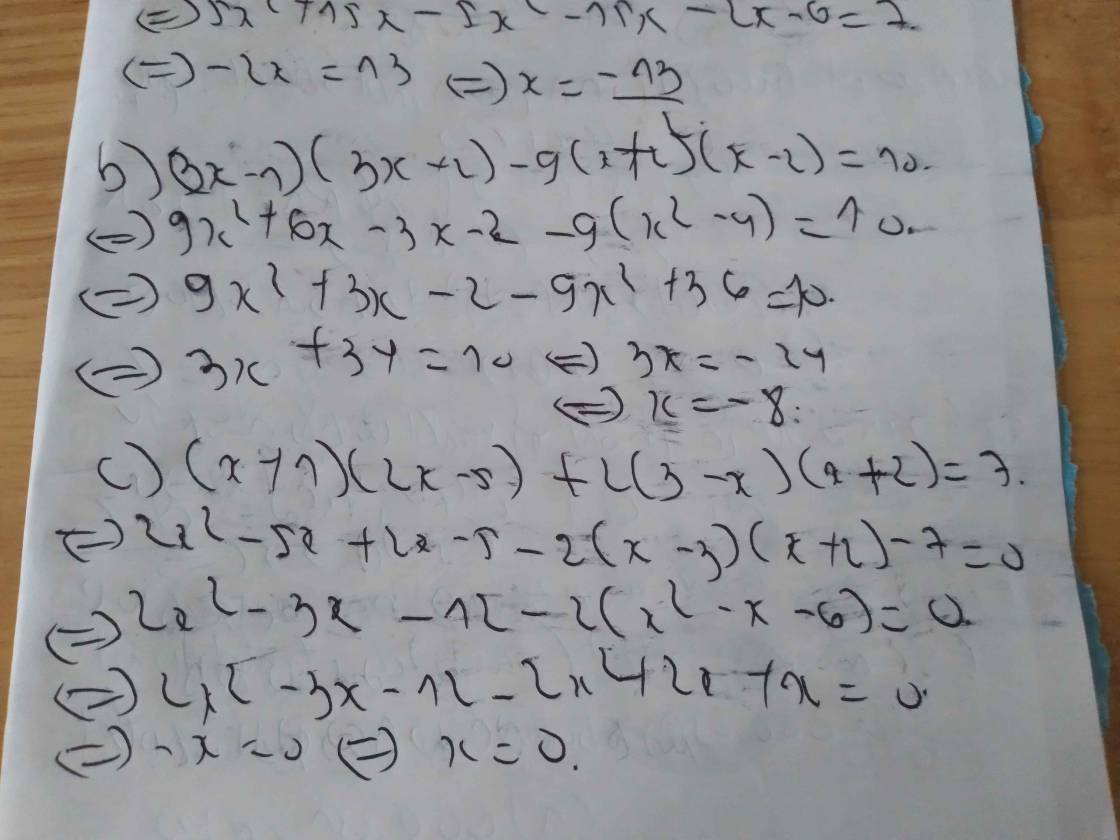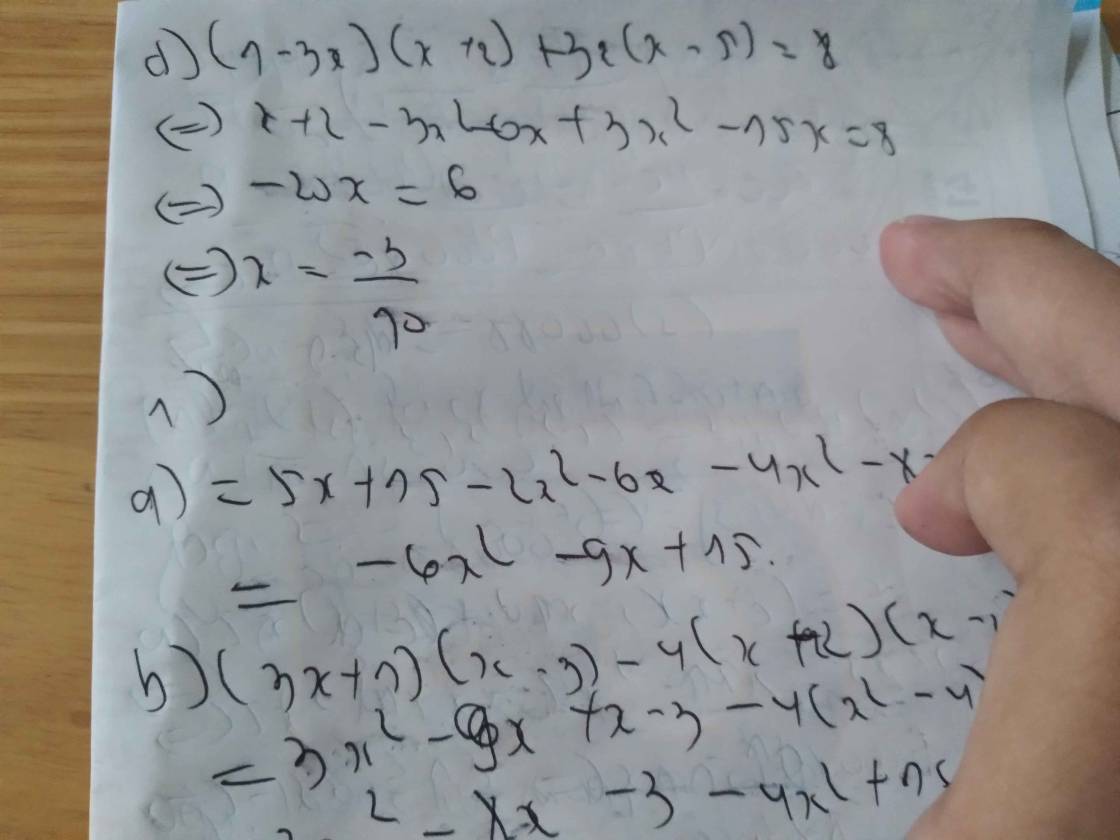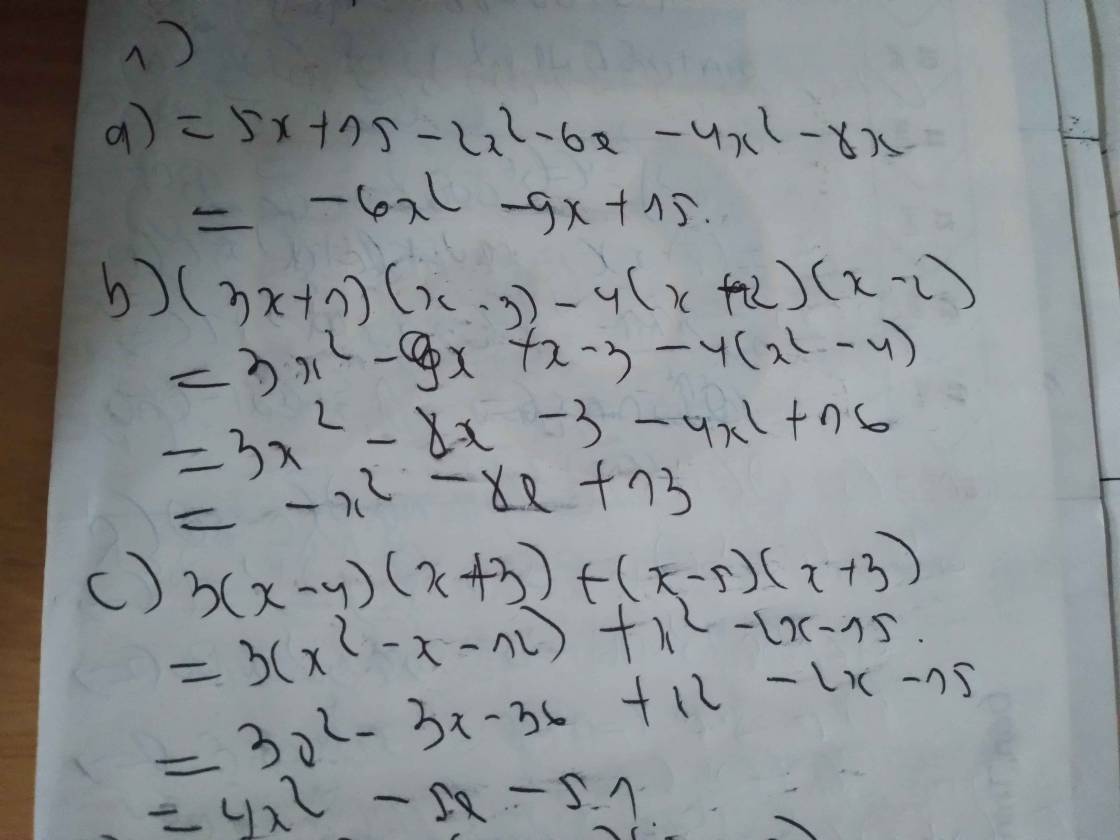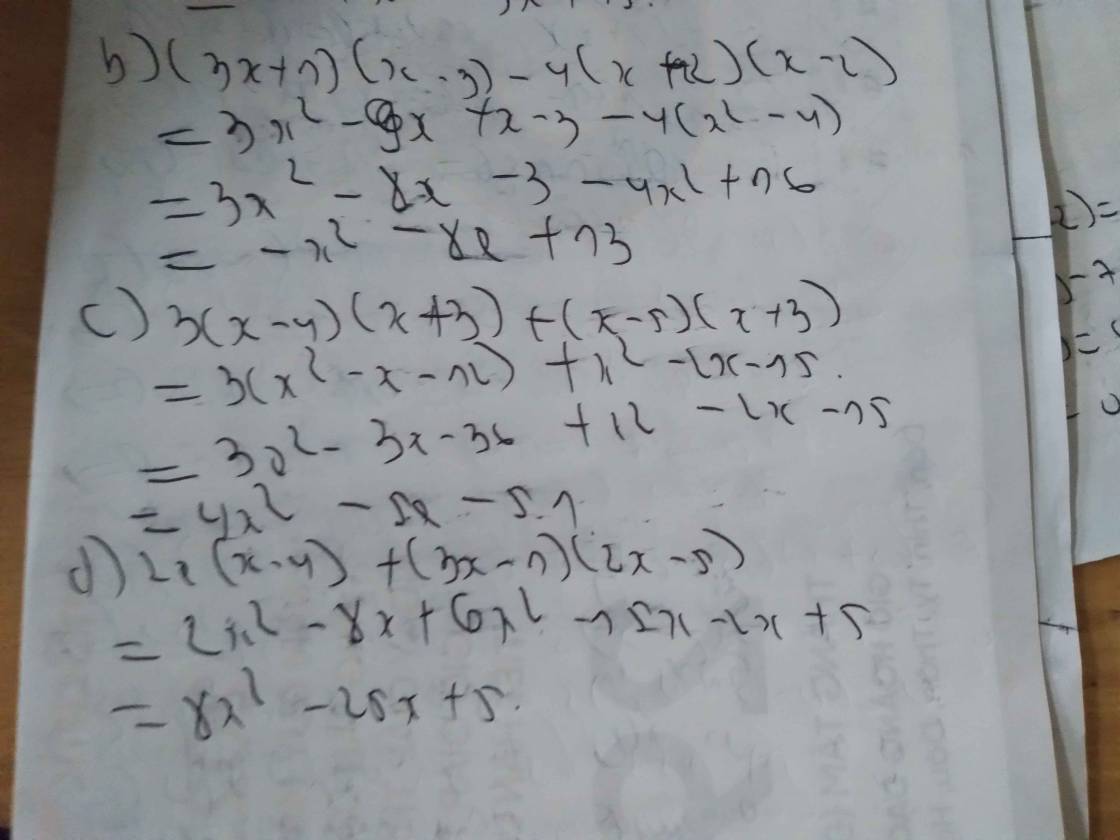B3: tìm x biết
a)x²-(x+4)(x+3)=26
b)(3x-1)(x+3)-(x+2)=1
H24
Những câu hỏi liên quan
tìm x biết
a,5x(x-4)3(x+2)(x-4)=2x(x+1)
b,4x(x+2)-x(8x-5)=10
c,(x+3)(2x-5)=2x(x+4)
d,(3x-2)(x+5)-3x(x+4)=5
e,x(x-3)+2x(x+1)=3(x mũ2-4)
b: =>4x^2+8x-8x^2+5x-10=0
=>-4x^2+13x-10=0
=>x=2 hoặc x=5/4
c: =>2x^2-5x+6x-15=2x^2+8x
=>x-15=8x
=>-7x=15
=>x=-15/7
d: =>3x^2+15x-2x-10-3x^2-12x=5
=>x-10=5
=>x=15
e: =>x^2-3x+2x^2+2x=3x^2-12
=>-x=-12
=>x=12
Đúng 0
Bình luận (0)
Bài 1:Thực hiện phép tính
a,(5-2x)(x+3)-4x(x+2) b,(3x+1)(x-3)-4(x+2)(x-2)
c,3(x-4)(x+3)+(x-5)(x+3) d,2x(x-4)+(3x-1)(2x-5)
Bài 2:Tìm x biết
a,5x(x+3)-(5x+2)(x+3)=7
b,(3x-1)(3x+2)-9(x+2)(x-2)=10
c,(x+1)(2x-5)+2(3-x)(x+2)=7
d,(1-3x)(x+2)+3x(x-5)=8
Tìm x biết
a) -2x(x+3)+x(2x-1)=10
b) (2/3x)(9x/2+1/4)-(3x2x+2)=3
a: -2x(x+3)+x(2x-1)=10
=>-2x^2-6x+2x^2-x=10
=>-7x=10
=>x=-10/7
b: Sửa đề: 2/3x(9/2x+1/4)-(3x^2+2)=3
=>3x^2+1/6x-3x^2-2=3
=>1/6x-2=3
=>x=30
Đúng 0
Bình luận (1)
Tìm x, biếta)dfrac{1}{2}xx-dfrac{7}{3}dfrac{-5}{6}+dfrac{3}{4}xxb)dfrac{4}{5}xx-dfrac{6}{5}dfrac{1}{2}+dfrac{3}{2}xxc)dfrac{2}{5}x(3xx+dfrac{3}{4})1dfrac{1}{5}-dfrac{1}{3}xxd)2x(3xx
+dfrac{3}{4})+dfrac{4}{5}dfrac{1}{2}-2xx
Đọc tiếp
Tìm x, biết
a)\(\dfrac{1}{2}\)x\(x\)-\(\dfrac{7}{3}\)=\(\dfrac{-5}{6}\)+\(\dfrac{3}{4}\)x\(x\)
b)\(\dfrac{4}{5}\)x\(x\)-\(\dfrac{6}{5}\)=\(\dfrac{1}{2}\)+\(\dfrac{3}{2}\)x\(x\)
c)\(\dfrac{2}{5}\)x(3x\(x\)+\(\dfrac{3}{4}\))=\(1\dfrac{1}{5}\)-\(\dfrac{1}{3}\)x\(x\)
d)2x(3x\(x \)+\(\dfrac{3}{4}\))+\(\dfrac{4}{5}\)=\(\dfrac{1}{2}\)-2x\(x\)
giúp mình giải bài toán trên với. Mình cảm ơn rất nhiều
Đúng 0
Bình luận (0)
a: =>1/2x-3/4x=-5/6+7/3
=>-1/4x=14/6-5/6=3/2
=>x=-3/2*4=-6
b: =>4/5x-3/2x=1/2+6/5
=>-7/10x=17/10
=>x=-17/7
c: =>6/5x+6/20=6/5-1/3x
=>6/5x+1/3x=6/5-3/10=12/10-3/10=9/10
=>x=27/46
d: =>6x+3/2+4/5=1/2-2x
=>8x=1/2-3/2-4/5=-1-4/5=-9/5
=>x=-9/40
Đúng 0
Bình luận (0)
tìm x , biết
a. 4x(x-5)-(x-1)(4x-3)=5
b. (3x-4)(x-2) = 3x(x-9)-3
c.2(x+3)-x2 -3x=0
d. 8x3-50x=0
e. (4x-30)2-3x(3-4x)
\(a,\Rightarrow4x^2-20x-4x^2+3x+4x-3=5\\ \Rightarrow-13x=8\Rightarrow x=-\dfrac{8}{13}\\ b,\Rightarrow3x^2-10x+8-3x^2+27x=-3\\ \Rightarrow17x=-11\Rightarrow x=-\dfrac{11}{17}\\ c,\Rightarrow\left(x+3\right)\left(2-x\right)=0\Rightarrow\left[{}\begin{matrix}x=-3\\x=2\end{matrix}\right.\\ d,\Rightarrow2x\left(4x^2-25\right)=0\\ \Rightarrow2x\left(2x-5\right)\left(2x+5\right)=0\Rightarrow\left[{}\begin{matrix}x=0\\x=\dfrac{2}{5}\\x=-\dfrac{2}{5}\end{matrix}\right.\\ e,Sửa:\left(4x-3\right)^2-3x\left(3-4x\right)=0\\ \Rightarrow\left(4x-3\right)^2+3x\left(4x-3\right)=0\\ \Rightarrow\left(4x-3\right)\left(7x-3\right)=0\Rightarrow\left[{}\begin{matrix}x=\dfrac{3}{4}\\x=\dfrac{3}{7}\end{matrix}\right.\)
Đúng 1
Bình luận (0)
a.
4x(x-5) - (x-1)(4x-3)-5=0
4x^2-20x-4x^2+3x+4x+3=0
(4x^2-4x^2)+(-20x+3x+4x)+3=0
13x+3 = 0
13x=-3
x=-3/13
b,
(3x-4)(x-2)-3x(x-9)+3=0
3x^2-6x-4x+8 - 3x^2+27x+3=0
(3x^2-3x^2)+(-6x-4x+27x)+(8+3)=0
17x+11=0
17x=-11
x=-11/17
c, 2(x+3)-x^2-3x=0
2(x+3) - x(x+3)=0
(x+3)(2-x)=0
TH1: x+3 = 0; x=-3
TH2: 2-x=0;x=2
Đúng 0
Bình luận (0)
Bài 4 : Tìm x biết
a)x( x-2 ) + x - 2 = 0
a) 5x( x-3 ) - x+3 = 0
b) (3x + 5)(4 – 3x) = 0
c) 3x(x – 7) – 2(x – 7) = 0
a) \(\Rightarrow\left(x-2\right)\left(x+1\right)=0\Rightarrow\left[{}\begin{matrix}x=2\\x=-1\end{matrix}\right.\)
b) \(\Rightarrow\left(x-3\right)\left(5x-1\right)=0\Rightarrow\left[{}\begin{matrix}x=3\\x=\dfrac{1}{5}\end{matrix}\right.\)
c) \(\Rightarrow\left[{}\begin{matrix}x=-\dfrac{5}{3}\\x=\dfrac{4}{3}\end{matrix}\right.\)
d) \(\Rightarrow\left(x-7\right)\left(3x-2\right)=0\Rightarrow\left[{}\begin{matrix}x=7\\x=\dfrac{2}{3}\end{matrix}\right.\)
Đúng 6
Bình luận (0)
\(a,\Leftrightarrow\left(x-2\right)\left(x+1\right)=0\Leftrightarrow\left[{}\begin{matrix}x=2\\x=-1\end{matrix}\right.\\ b,\Leftrightarrow\left(x-3\right)\left(5x-1\right)=0\Leftrightarrow\left[{}\begin{matrix}x=3\\x=\dfrac{1}{5}\end{matrix}\right.\\ c,\Leftrightarrow\left[{}\begin{matrix}x=-\dfrac{5}{3}\\x=\dfrac{4}{3}\end{matrix}\right.\\ d,\Leftrightarrow\left(x-7\right)\left(3x-2\right)=0\Leftrightarrow\left[{}\begin{matrix}x=7\\x=\dfrac{2}{3}\end{matrix}\right.\)
Đúng 4
Bình luận (0)
Tìm số nguyên x, biết
a) \(-\dfrac{x}{2}+\dfrac{2x}{3}+\dfrac{x+1}{4}+\dfrac{2x+1}{6}=\dfrac{8}{3}\)
b) \(\dfrac{3}{2x+1}+\dfrac{10}{4x+2}-\dfrac{6}{6x+3}=\dfrac{12}{26}\)
\(a,-\dfrac{x}{2}+\dfrac{2x}{3}+\dfrac{x+1}{4}+\dfrac{2x+1}{6}=\dfrac{8}{3}\)
\(\Rightarrow-\dfrac{6x}{12}+\dfrac{8x}{12}+\dfrac{3\left(x+1\right)}{12}+\dfrac{2\left(2x+1\right)}{12}=\dfrac{8}{3}\)
\(\Rightarrow\dfrac{-6x+8x+3x+3+4x+2}{12}=\dfrac{8}{3}\)
\(\Rightarrow\dfrac{9x+5}{12}=\dfrac{8}{3}\)
\(\Rightarrow27x+15=96\)
\(\Rightarrow27x=81\)
\(\Rightarrow x=3\left(tm\right)\)
\(b,\dfrac{3}{2x+1}+\dfrac{10}{4x+2}-\dfrac{6}{6x+3}=\dfrac{12}{26}\)
\(\Rightarrow\dfrac{3}{2x+1}+\dfrac{10}{2\left(2x+1\right)}-\dfrac{6}{3\left(2x+1\right)}=\dfrac{6}{13}\)
\(\Rightarrow\dfrac{3}{2x+1}+\dfrac{5}{2x+1}-\dfrac{2}{2x+1}=\dfrac{6}{13}\)
\(\Rightarrow\dfrac{3+5-2}{2x+1}=\dfrac{6}{13}\)
\(\Rightarrow\dfrac{6}{2x+1}=\dfrac{6}{13}\)
\(\Rightarrow2x+1=13\)
\(\Rightarrow2x=12\)
\(\Rightarrow x=6\left(tm\right)\)
#Toru
Đúng 4
Bình luận (2)
a) \(-\dfrac{x}{2}+\dfrac{2x}{3}+\dfrac{x+1}{4}+\dfrac{2x+2}{6}=\dfrac{8}{3}\)
\(\Rightarrow\dfrac{-6x}{12}+\dfrac{8x}{12}+\dfrac{3\left(x+1\right)}{12}+\dfrac{2\left(2x+1\right)}{12}=\dfrac{4\cdot8}{12}\)
\(\Rightarrow-6x+8x+3x+3+4x+2=32\)
\(\Rightarrow9x+5=32\)
\(\Rightarrow9x=32-5\)
\(\Rightarrow9x=27\)
\(\Rightarrow x=\dfrac{27}{9}\)
\(\Rightarrow x=3\)
b) \(\dfrac{3}{2x+1}+\dfrac{10}{4x+2}-\dfrac{6}{6x+3}=\dfrac{12}{26}\) (ĐK: \(x\ne-\dfrac{1}{2}\))
\(\Rightarrow\dfrac{3}{2x+1}+\dfrac{10}{2\left(2x+1\right)}-\dfrac{6}{3\left(2x+1\right)}=\dfrac{6}{13}\)
\(\Rightarrow\dfrac{3}{2x+1}+\dfrac{5}{2x+1}-\dfrac{2}{2x+1}=\dfrac{6}{13}\)
\(\Rightarrow\dfrac{6}{2x+1}=\dfrac{6}{13}\)
\(\Rightarrow2x+1=13\)
\(\Rightarrow2x=12\)
\(\Rightarrow x=\dfrac{12}{2}\)
\(\Rightarrow x=6\left(tm\right)\)
Đúng 2
Bình luận (1)
Tìm số tự nhiên x,biết
a,(x-15)*27=0
b,23*(42-x)=23
c,(9x+2)*3=60
d,71+(26-3x):5=75
Lời giải:
a.
$(x-15).27=0$
$x-15=0:27=0$
$x=15+0=15$
b.
$23(42-x)=0$
$42-x=0$
$x=42$
c.
$(9x+2).3=60$
$9x+2=60:3=20$
$9x=18$
$x=2$
d.
$71+(26-3x):5=75$
$(26-3x):5=75-71=4$
$26-3x=4.5=20$
$3x=26-20=6$
$x=6:2=3$
Đúng 0
Bình luận (0)
Bài 1: Tìm x, biếta) 3dfrac{1}{3} x+ 16dfrac{3}{4} -13,25b) 3dfrac{2}{7}.x - dfrac{1}{8} 2dfrac{3}{4} c) x : 4dfrac{1}{3} - 2,5d) (dfrac{3x}{7} + 1) : (-4) dfrac{-1}{28}giúp em
Đọc tiếp
Bài 1: Tìm x, biết
a) 3\(\dfrac{1}{3}\) x+ 16\(\dfrac{3}{4}\) = -13,25
b) 3\(\dfrac{2}{7}\).x - \(\dfrac{1}{8}\) = 2\(\dfrac{3}{4}\)
c) x : 4\(\dfrac{1}{3}\) = - 2,5
d) (\(\dfrac{3x}{7}\) + 1) : (-4) = \(\dfrac{-1}{28}\)
giúp em
`#040911`
`a)`
`3 1/3 x + 16 3/4 = -13,25`
`=> 3 1/3 x = -13,25 - 16 3/4`
`=> 3 1/3 x = -30`
`=> x = -30 \div 3 1/3`
`=> x =-9`
Vậy, `x = -9`
`b)`
`3 2/7*x - 1/8 = 2 3/4`
`=> 3 2/7x = 2 3/4 + 1/8`
`=> 3 2/7x = 23/8`
`=> x = 23/8 \div 3 2/7`
`=> x = 7/8`
Vậy, `x = 7/8`
`c)`
`x \div 4 1/3 = -2,5`
`=> x = -2,5 * 4 1/3`
`=> x = -65/6`
Vậy, `x = -65/6`
`d)`
`( (3x)/7 + 1) \div (-4) = (-1)/28`
`=> (3x)/7 +1 = (-1)/28 * (-4)`
`=> (3x)/7 + 1 = 1/7`
`=> (3x)/7 = 1/7 - 1`
`=> (3x)/7 = -6/7`
`=> 3x = -6`
`=> x = -6 \div 3`
`=> x = -2`
Vậy, `x = -2.`
Đúng 2
Bình luận (0)
a
=>10/3 . x + 16 + 3/4 = -13,25
=>10/3 x + 3/4 = -29,25
=>10/3 x = -30
=>x=-30 : 10/3
=>x=-30 . 3/10
=>x=-9
b.
=>23/7 x - 1/8 = = 11/4
=>23/7 x = 11/4 + 1/8
=>23/7 x= 22/8 + 1/8
=>23/7 x= 23/8
=>x=23/8 : 23/7
=>x=23/8 . 7/23
=>x=7/8
c.
=>x : 13/3 =-5/2
=>x=-5/2 . 13/3
=>x=-65/6
d.
=>3x/7 +1 = (-1/28) . (-4)
=>3x/7 + 1 = 1/7
=>3x/7 = -6/7
=>3x=-6
=>x=-2
Đúng 0
Bình luận (0)
a) \(3\dfrac{1}{3}x+16\dfrac{3}{4}=-13,25\)
\(\Rightarrow\dfrac{10}{3}x+\dfrac{67}{4}=-\dfrac{53}{4}\)
\(\Rightarrow\dfrac{10}{3}x=-30\)
\(\Rightarrow x=-30:\dfrac{10}{3}\)
\(\Rightarrow x=-9\)
b) \(3\dfrac{2}{7}x-\dfrac{1}{8}=2\dfrac{3}{4}\)
\(\Rightarrow\dfrac{23}{7}x-\dfrac{1}{8}=\dfrac{11}{4}\)
\(\Rightarrow\dfrac{23}{7}x=\dfrac{11}{4}+\dfrac{1}{8}\)
\(\Rightarrow\dfrac{23}{7}x=\dfrac{23}{8}\)
\(\Rightarrow x=\dfrac{23}{8}:\dfrac{23}{7}\)
\(\Rightarrow x=\dfrac{7}{8}\)
c) \(x:4\dfrac{1}{3}=-2,5\)
\(\Rightarrow x:\dfrac{13}{3}=-\dfrac{5}{2}\)
\(\Rightarrow x=-\dfrac{5}{2}\cdot\dfrac{13}{3}\)
\(\Rightarrow x=-\dfrac{65}{6}\)
d) \(\left(\dfrac{3x}{7}+1\right):\left(-4\right)=\dfrac{-1}{28}\)
\(\Rightarrow\dfrac{3x}{7}+1=\dfrac{-1}{28}\cdot-4\)
\(\Rightarrow\dfrac{3x}{7}+1=\dfrac{1}{7}\)
\(\Rightarrow\dfrac{3x}{7}=-\dfrac{6}{7}\)
\(\Rightarrow x=-\dfrac{6}{7}:\dfrac{3}{7}\)
\(\Rightarrow x=-2\)
Đúng 0
Bình luận (0)
tìm x , biết
a) 17/6- x( x-7/6)= 7/4
b) 3/35 - ( 3/5-x)= 2/7
tìm x thuộc Z , biết
3/4-5/6 < x/12 < 1 -( 2/3-1/4)
tìm x biết
a ) 2x-3=x + 1/2
b) 4x- ( x+ 1/2) = 2x - ( 1/2 - 5 )
Bài 1:
a) Ta có: \(\dfrac{17}{6}-x\left(x-\dfrac{7}{6}\right)=\dfrac{7}{4}\)
\(\Leftrightarrow\dfrac{17}{6}-x^2+\dfrac{7}{6}x-\dfrac{7}{4}=0\)
\(\Leftrightarrow-x^2+\dfrac{7}{6}x+\dfrac{13}{12}=0\)
\(\Leftrightarrow-12x^2+14x+13=0\)
\(\Delta=14^2-4\cdot\left(-12\right)\cdot13=196+624=820\)
Vì Δ>0 nên phương trình có hai nghiệm phân biệt là:
\(\left\{{}\begin{matrix}x_1=\dfrac{14-2\sqrt{205}}{-24}=\dfrac{-7+\sqrt{205}}{12}\\x_2=\dfrac{14+2\sqrt{2015}}{-24}=\dfrac{-7-\sqrt{205}}{12}\end{matrix}\right.\)
b) Ta có: \(\dfrac{3}{35}-\left(\dfrac{3}{5}-x\right)=\dfrac{2}{7}\)
\(\Leftrightarrow\dfrac{3}{5}-x=\dfrac{3}{35}-\dfrac{10}{35}=\dfrac{-7}{35}=\dfrac{-1}{5}\)
hay \(x=\dfrac{3}{5}-\dfrac{-1}{5}=\dfrac{3}{5}+\dfrac{1}{5}=\dfrac{4}{5}\)
Đúng 4
Bình luận (0)
Bài 3:
a) Ta có: \(2x-3=x+\dfrac{1}{2}\)
\(\Leftrightarrow2x-x=\dfrac{1}{2}+3\)
\(\Leftrightarrow x=\dfrac{7}{2}\)
b) Ta có: \(4x-\left(x+\dfrac{1}{2}\right)=2x-\left(\dfrac{1}{2}-5\right)\)
\(\Leftrightarrow3x-\dfrac{1}{2}-2x+\dfrac{1}{2}-5=0\)
\(\Leftrightarrow x=5\)
Đúng 0
Bình luận (0)


